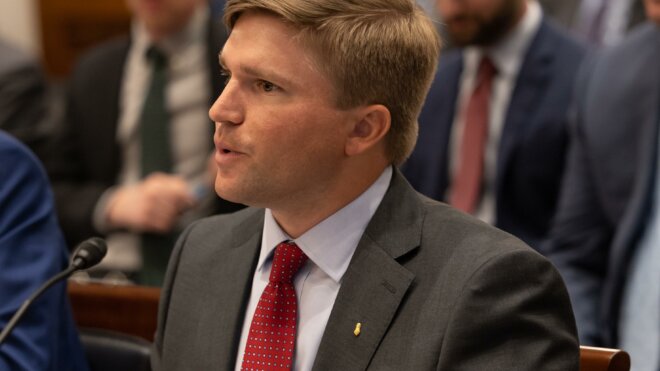Released: April 27, 2023
TIFTON, Ga. – The U.S. House Agriculture Subcommittee on General Farm Commodities, Risk Management, and Credit held a hearing on Tuesday, April 26, entitled “Producer Perspectives on the 2023 Farm Bill”. Representing the U.S. Peanut Federation was Daniel McMillan of Southern Grace Farms in Enigma, Georgia.
In McMillan’s testimony, he presented peanut priorities for the 2023 Farm Bill, namely an increase in the reference price for the Price Loss Coverage (PLC) Program. Over the last few years, peanut growers have seen a significant increase in the cost of production. According to Dr. Stanley Fletcher of Abraham Baldwin Agricultural College and Professor Emeritus at the University of Georgia, the 2021 cost of production was $545.97 per ton, and the 2022 cost of production is approximately $668 per ton.
McMillan outlined the financial stressors that peanut growers are facing on the farm, stating:
“In my home area, we saw fertilizer costs double from 2021 to 2022. Some products tripled in price. Currently, fertilizer prices are changing week to week preventing us from making informed management decisions. Commonly used fertilizers include diammonium phosphate (DAP), Potash, and Urea.
Crop protectant prices remain high which can pressure farmers to look for cheaper options, sometimes to the detriment of the crop. Labor costs continue to increase. We use H2A workers and have seen a 14% increase in labor costs through the recent U.S. Department of Labor Adverse Effect Wage Rate (AEWR) changes. We are still facing cost increases and business disruptions resulting from problems with the supply chain. This past week, we went to a local parts store to buy a bundle of small metal sweeps for a field cultivator. A simple wear part cost $2 each in 2021 but today is $6 each. This may not sound like much, but we are seeing this across hundreds of items totaling thousands of dollars in extra costs. We have had up to six-month delays in mechanical repairs for some tractors and trucks. Due to the short supply of tractors, even rental tractors have become scarce. We saw costs for one of our rental tractors move from $2000 per month in 2019 to $3500 per month in 2023 for the same tractor. These are all increases that make it difficult to plan and budget.”
McMillan also voiced the support of the U.S. Peanut Federation for a voluntary base update that includes growers with and without peanut base acres. While the 2014 Farm Bill allowed for base updating for peanut growers that already had base on their farms, it excluded many young farmers and new production areas.
Subcommittee Chairman Austin Scott (GA-08) opened the hearing, stating “Title I programs, specifically the Agricultural Risk Coverage and Price Loss Coverage—or ARC and PLC—were established in the 2014 Farm Bill and the reference prices used to determine assistance were set using 2012 cost of production data. Meanwhile, inflation has gone up significantly since 2012, and the price of most inputs have doubled or even tripled since 2021 alone. Farm sector debt is at record high levels, and net farm income is expected to fall 16 percent from 2022 to 2023. These warning signs underscore the importance of our work in the 2023 Farm Bill.
In addition to McMillan, nine other representatives of commodity crop groups testified, including corn, cotton, dry pea and lentil, rice, canola, soybean, sugar cane, wheat, and sorghum.
Rep. David Rouzer (NC-07) closed the hearing by asking each of the witnesses, if they had to choose, what would be the one thing that would be adjusted in the 2023 Farm Bill. McMillan provided the final answer of the hearing, stating “if peanut producers could have one thing, within the PLC program, the framework works, but we need a reference price increase to have a viable safety net.”
Watch the full hearing here.
###
The United States Peanut Federation (USPF) is comprised of the Southern Peanut Farmers Federation, the American Peanut Shellers Association, and the National Peanut Buying Points Association. USPF serves as a unified voice in Washington, D.C. for all sectors of the peanut industry and advocates actively for strong agricultural policy. For additional information, please contact the USPF at (202) 543-7464.

